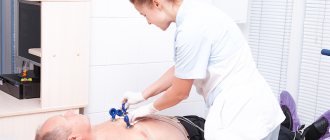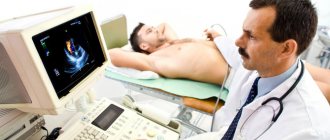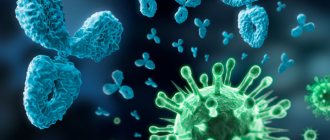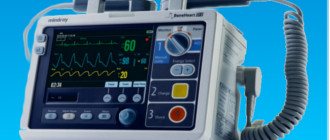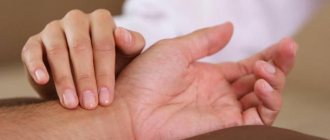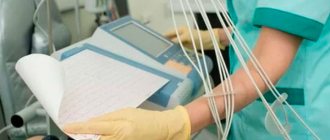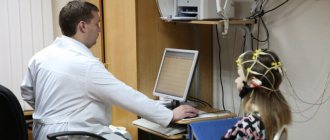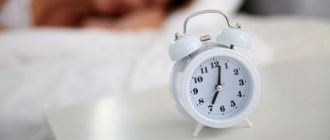Diagnosing coronary heart disease is not always an easy task. In some cases, the diagnosis is beyond doubt. But there are also situations when the patient’s complaints are ambiguous, and studies performed at rest do not completely exclude this serious disease. Then the attending physician prescribes stress echocardiography.
During this study, the subject’s heart works under conditions of increased load:
- 1) Physical a
treadmill (treadmill) or bicycle (bicycle ergometer); - 2) Pharmacological ,
when a drug injected into a patient’s vein makes his heart beat stronger and faster.
The essence of the method: the use of these loads increases oxygen consumption by the heart. At the same time, in a healthy person, the arteries that encircle the heart (coronary) bring him the necessary amount of oxygen and the contractility of the heart evenly increases. And in a patient with narrowed coronary arteries, the blood flow does not increase adequately to the load, the contractility of the heart is regionally impaired, which is recorded by the doctor on the monitor of the ultrasound machine.
Carrying out stress echo-CG
The total examination time is no more than 45 minutes. It takes place in several stages:
- The patient lies on the couch on his left side. A gel is applied to the chest area and a resting ultrasound is performed.
- A load is placed on the heart depending on the chosen technique. During a pharmacological test, drugs are administered. Physical activity is created on a treadmill or bicycle ergometer.
- During a pharmacological test, heart parameters are recorded during the period of exercise. When using a bicycle ergometer, ultrasound of the heart is performed immediately after completion of the movement.
- The intensity increases every 2-3 minutes.
- The duration of the test is 10-15 minutes.
The doctor compares the results of ultrasound at rest and movement. The analysis makes it possible to make a correct diagnosis of heart disease.
In our clinic, patients can get advice from experienced cardiologists and functional diagnostic doctors and undergo stress echo-CG. We employ leading specialists who regularly improve their skills. The latest Swiss and Italian equipment is used for diagnostics. By contacting us, the patient receives a guarantee of the quality of medical services. Call or schedule a consultation online at a convenient time.
Preparation
- 3 days before the test, you must stop taking certain medications, primarily beta blockers, under the supervision of your doctor.
- Patients with arterial hypertension should come for the test with a blood pressure below 180/110 mmHg. High blood pressure is a contraindication for the study.
- The day before the study, you should not smoke, drink alcohol or coffee.
- 3 hours in advance - you must stop eating and limit physical activity. You can drink water.
- You must bring comfortable sportswear and shoes.
- You must have with you: a referral from your attending physician, the latest ECG, an EchoCG report, and for a pharmacological test, a Holter monitoring report.
Indications and contraindications for the study
Stress echocardiography is prescribed in the following cases:
- diagnosis of ischemia if the patient complains of chest pain during physical activity;
- assessment of the course of the disease, for example, after myocardial infarction;
- identifying the risk of heart attack when preparing for heart surgery;
- recognizing the causes of shortness of breath;
- assessment of organ function after bypass or stenting;
- identification of myocardial zones that do not receive enough oxygen;
- determination of the severity of heart valve disease.
Most often, patients are referred for a bicycle ergometry or treadmill test. Not all medical institutions have equipment for stress echocardiography. But our clinic has the necessary equipment to carry out the test, so patients can take it at any time.
Stress echocardiography is recommended for people with high blood pressure, arthrosis, varicose veins, insufficient heart fitness and the presence of a pacemaker. The study is indicated when the results of the stress test are questionable.
There are also contraindications that prevent the patient from conducting the study. The absolute ones include the first days after a heart attack, instability of the heart rhythm, accompanied by fainting and dizziness. The test cannot be performed in case of acute myocardial inflammation or coronary syndrome, aortic stenosis, or aortic aneurysm. Progressive heart failure and pulmonary infarction also interfere with the analysis.
There are also a number of relative contraindications to the test, after eliminating which the patient is allowed to undergo the study:
- stenosis of the coronary artery or heart valves;
- hypertension that cannot be eliminated with medications;
- left ventricular aneurysm;
- bradycardia;
- acute infections;
- mental illness.
The doctor determines on an individual basis whether the patient is ready for testing. If there are contraindications, safer manipulations are selected for the patient.
The procedure for performing stress echocardiography:
- The patient changes clothes, electrodes for recording an ECG and a cuff for measuring blood pressure are attached to his body.
- At the first stage of the procedure, the doctor records an ultrasound of the heart at rest.
- Then the patient is given an ever-increasing physical or pharmacological load, the doctor monitors and records ECG changes, pulse rate and blood pressure, the absence or occurrence of complaints.
- As soon as the patient performs the amount of physical activity characteristic of his gender, age and health status, a repeat ultrasound of the heart is performed. With a pharmacological test, the doctor performs an ultrasound of the heart throughout the test. After stopping the test, the patient is monitored for about 10 minutes.
- All recorded indicators are saved on a computer, processed and compared. The total duration of the test is 40-60 minutes, after which the patient receives a conclusion.
Types of load tests
The type of technique is chosen depending on the patient’s heart condition. If the patient has problems with the musculoskeletal system, or an angina attack occurs during physical activity, drug or electrical stimulation is performed. For allergies to drugs, asthma and lung diseases, stress echocardiography with physical activity is used.
The latter study is used more often because the test conditions are as close as possible to real life. A type of stress echocardiography is the treadmill test and bicycle ergometry. Despite the reliability of the information, due to shortness of breath it is not possible to obtain a clear image of the left ventricle.
How is the treadmill test performed?
Treadmill test
The patient is asked to walk on a treadmill, while the parameters of its movement change: every three minutes the speed and inclination of the treadmill increase.
The examination is carried out by a functional diagnostics doctor. The following data is recorded: ECG, blood pressure (blood pressure), pulse oximetry (blood oxygen saturation), heart rate (heart rate). These data are taken before the test, while on the treadmill and at the end of physical activity.
The results of the treadmill test allow you to determine the degree of tolerance to physical activity, as well as the threshold at which signs of the disease begin to clearly appear.
It is very important that the specialist conducts professional supervision in compliance with all necessary precautions, which is guaranteed to protect you from possible complications.
You can do a treadmill test in Moscow at JSC “Family Doctor”.
Cardiac Stress Test - Myocardial Perfusion with SPECT - Nuclear Stress Test
Myocardial Perfusion Imaging (Nuclear Stress Test)
Description
Myocardial perfusion with SPECT is a test that uses small doses of a radioactive agent to evaluate blood flow and heart function. Because blood flow to the heart is measured as the heart's activity increases, this test is usually done with exercise. If you are unable to exercise, your doctor may use a drug that increases the activity of your heart, thereby simulating exercise.
Reasons for conducting a nuclear stress test
A cardiac stress test is used to look for previous damage to the heart and the risk of future damage.
Specific reasons for performing this test include:
- Determining a patient's exposure to heart attack risk;
- Determining whether coronary angiography is needed. angioplasty or heart surgery;
- Search for areas of the heart muscle that have poor blood supply;
- Obtaining information about the pumping function of the heart;
- Determining heart damage that occurs after a heart attack;
- Checking the success of angioplasty or coronary artery bypass surgery.
Possible complications of a cardiac stress test
Complications may include:
- Chest pain;
- Irregular heart rhythm;
- Rarely - heart attack;
- Radioactive exposure.
During testing, technicians will closely monitor for any signs of heart or lung problems. They will be ready to take action if complications arise.
How is a cardiac stress test performed?
Preparation for the procedure
Before testing, tell your doctor if you have a medical condition that limits exercise. If you are unable to perform the exercises, your doctor may prescribe medications to simulate exercise. Tell your doctor if you have the following conditions:
- Bronchial asthma and chronic lung diseases;
- Arthritis. especially in the hips and knees.
For 24-48 hours before the test, do not eat or drink any of the foods or medications listed below:
- Drinks containing caffeine (such as coffee, tea, cola and other soft drinks);
- Products containing caffeine, such as chocolate (including candy, frosting, cakes, pastries, cookies, cocoa, chocolate milk);
- Painkillers that contain caffeine;
- Products that contain theophylline;
- Dipyridamole.
Read labels and ask your doctor or pharmacist for more information about foods you should avoid before the test.
You may be asked not to eat or drink for 4-8 hours before the test.
Wear loose clothing and low heels with rubber soles or tennis shoes.
If you smoke, you should abstain from smoking for 1-2 days, or at least four hours, before testing.
Tell your doctor if you:
- Have allergies;
- Are you taking any medications or dietary supplements?
- Have diabetes;
- For women - you are pregnant or may be pregnant;
- Breastfeed;
- You have prostheses or implants in your body.
Description of myocardial perfusion using SPECT
The test usually consists of two parts. The first part of the test is used to check the heart at rest.
The second part of the test, called stress, examines the heart after exercise or after taking a drug that mimics the effects of exercise. Your doctor will compare your heart's activity during exercise and at rest to evaluate your heart's health.
A blood pressure cuff is placed on one arm to measure blood pressure. An intravenous catheter is inserted into a vein in the other arm. Small, round pads (ECG electrodes) are placed on the chest and connected to an electrocardiograph. This will allow the doctor to monitor your heart rhythm. Blood pressure and heart rate are monitored before, during and after exercise.
A doctor or nurse injects a small amount of radioactive material into your bloodstream intravenously. The radioactivity of these materials is very low. Radioactive isotopes accumulate in the parts of the heart that have the best blood flow and emit signals that can be detected by a special camera. The pictures taken with the camera show all the parts of the heart that are not receiving enough blood. Pictures are taken at rest and during exercise.
The exercise or "stress" portion of the test is usually done on a treadmill. You will begin walking slowly on the treadmill. Every three minutes the speed gradually increases. When you exercise, your heart rate and blood pressure change. At the peak of the load, an additional radioactive substance is injected into the vein, and the load continues for another one or two minutes.
15-30 minutes after the “stress” you will be placed on a special table on which pictures of the heart will be taken.
If you are unable to exercise for some reason, your doctor may use a drug that mimics the effect of exercise on the heart. If you notice any changes or feel side effects, tell the doctor who is monitoring the testing.
If you have coronary heart disease. you may feel chest pain or angina during part of the test. A specialist will be there and may give you medication to reduce your symptoms or stop the test early. Tell your doctor if you experience symptoms of jaw, neck, arm, or chest pain.
After a cardiac stress test
You can go home.
If you receive a medicine that makes your heart work harder, you may experience anxiety symptoms. dizziness, nausea, shaking, or shortness of breath. Tell your doctor if you experience any of these symptoms. There is a possibility that the effects of the medications may last up to 24 hours after testing.
How long will a cardiac stress test take?
The entire test takes 3-5 hours. You can complete the entire test in one day, or the testing can be spread out over several days.
Cardiac stress test - will it hurt?
Usually this test should not be painful. If you receive the medicine, you may feel some discomfort such as redness, chest pressure, pain, or shortness of breath.
Cardiac stress test results
The doctor will compare pictures of the heart taken at rest with pictures of the heart during stress. If your heart is relatively healthy, there should be no difference (or very little difference) between pictures taken during stress and pictures taken at rest. If the heart arteries are partially blocked, pictures taken during stress will look different from pictures taken at rest.
Contacting your doctor after a cardiac stress test
- Symptoms do not go away or get worse;
- Other painful symptoms appear;
- You continue to experience side effects from the medications used during testing.
